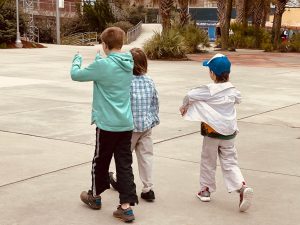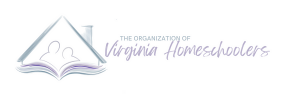Exploring Alternatives: Unschooling
I’ve never used a curriculum. I tried Muzzy once. It bored my kids faster than I could say gracias. I’ve attempted a few workbooks. My middle son summed it up when he knew far more than his new workbook on the Underground Railroad. I had to delve into far more intricate detail than its little paragraphs, then he had to pick out finicky, unnecessary facts and fill them in. Once filled in, you could unscramble a word from the answers. He looked at me and said, “Mama, why do I need to know this stuff?”
We’d been talking about navigation techniques former enslaved people used to find their way north; about quilts used as signposts; about ways former enslaved people were hidden; about the pivotal role Quakers played in eastern Pennsylvania’s abolition movement; about hiding places I’d seen growing up.
The workbook asked my son to pick out a word for enslaved people who made barrels.
One of these things was not like the other.
 There are, of course, good curricula. There are interesting, thought-provoking curricula, and they work for some people. In our house, three kids with ADHD are guided through their education by a mama with ADHD. We don’t do strict routine very well. We hyperfocus on our interests. We read, and read, and read. So instead of using a curriculum, we unschool. Cue the freakout: “un” + “school” must equal a total lack of guidance and real education.
There are, of course, good curricula. There are interesting, thought-provoking curricula, and they work for some people. In our house, three kids with ADHD are guided through their education by a mama with ADHD. We don’t do strict routine very well. We hyperfocus on our interests. We read, and read, and read. So instead of using a curriculum, we unschool. Cue the freakout: “un” + “school” must equal a total lack of guidance and real education.
It doesn’t, even if it sounds that way.
My kids have never been crowbarred into learning more than math (which they will not do without being told) and grammar (which I maintain they’ll need to learn a new language; my nerdy obsession with The Chicago Manual of Style has absolutely nothing to do with insisting my children learn their subordinate conjunctions, so help me God). Because they’ve never been thrown into some brand of formal education, they don’t see a barrier between school and life, or reading “for fun” or reading “for school.” We provide access to interesting material and opportunities. They take advantage of them. Or not. But they usually do.
Often people claim this doesn’t work. Obviously, I couldn’t dump my kids in school and expect great results. When they can’t spell, but they can hold an extended discourse on Emperor Trajan, school becomes . . . difficult. And yes, I worried about my middle kid’s reading until he revealed he’d been reading college-level, David Attenborough books before bed every night. I literally had no idea. I thought he was stuck on little-kid graphic novels.
So they learn history through interesting books, movies, and field trips (and rants about historical inconsistencies in Hamilton). They learn a lot in the car: I talked to my oldest about LGBTQIA+ rights and the AIDS crisis while we were driving home from Target once. I cried. This is another reason we homeschool: horrible things have happened in the world. I would rather my children understand their visceral, human impact than read one-dimensional facts in a textbook: Some enslaved people were coopers. Or, Here’s “Strange Fruit.” It talks about lynching in the South. Here’s what that means.
Through unschooling, my kids are free to follow their own interests—from coding and historical, folklore and cryptozoology, to plagues and spies, salamanders and amphibian identification. Pick up a toad. My ten-year-old can identify it. His spelling sucks. But I’d trade curiosity for creative spelling any day.
They choose their writing topics. They choose their reading. They choose to engage with whatever science appeals to them (and with a parent who’s an amateur paleontologist and naturalist, we’ve got that covered). They choose their history topics. We do plenty of “school.” But it looks very little like traditional schooling.
My children are happy.
My children are curious.
My children love to learn, and I love to learn along with them. I didn’t know Emperor Trajan from the man on the moon. Now I do. Wars have been taught through graphic novels and family stories passed down from their grandparents and great-grandparents. I’m #blessed (God, I hate that term, but it works here) to share in their learning journeys.
It’s not conventional.
It’s not for everyone.
But it works wonders for my kids.
Eliza spends most of her time unschooling her three sons, all of whom have cool names and love David Bowie. When she isn’t writing, she’s kayaking or hiking. You can find her on Facebook, Instagram, and Twitter, or visit her website, which contains links to both her essays and young adult novels.
Opinions expressed by individual writers in this blog do not necessarily reflect the views of the Board of Directors of The Organization of Virginia Homeschoolers, nor do they represent an official position of VaHomeschoolers. Writers’ views are their own, and readers are encouraged to research and explore homeschooling issues to their own satisfaction.

 After earning numerous writing awards during her graduate program in fiction, Elizabeth Broadbent taught creative writing and wrote in the freelance (read: non-fiction) world, with pieces appearing in The Washington Post, Time Magazine, Insider, and The Huffington Post. During that time, she was a featured guest on CNN, NPR, and Canadian public radio. She was also a longtime Scary Mommy staff writer.
After earning numerous writing awards during her graduate program in fiction, Elizabeth Broadbent taught creative writing and wrote in the freelance (read: non-fiction) world, with pieces appearing in The Washington Post, Time Magazine, Insider, and The Huffington Post. During that time, she was a featured guest on CNN, NPR, and Canadian public radio. She was also a longtime Scary Mommy staff writer.